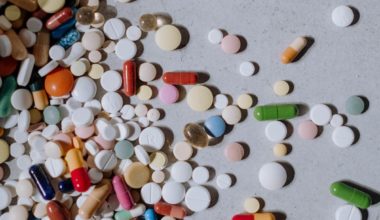In the pre-pandemic days of happy hours, holiday parties, and book clubs, alcohol was often seen as a social lubricant and a symbol of celebration. While quarantined at home, a glass of wine has become part of a toast to another day in lockdown checked off, part of the agenda when on a Zoom with friends, a highlight of an outdoor, patio gathering. And though an occasional glass of wine with dinner isn’t a cause for concern, the cumulative effects of drinking alcohol can take its toll, and drinking too much can be a sign of substance use disorder.
Signs You’re Drinking Too Much
According to the National Institute on Alcohol Abuse and Alcoholism (NIAAA), “drinking becomes too much when it causes or elevates the risk of alcohol-related problems or complicates the management of other health problems.” And although the Dietary Guidelines for Americans states moderate alcohol consumption is defined as up to one drink per day for women and up to two drinks per day for men, there’s no specific amount of alcohol or frequency of drinking that determines “too much.”
With all of this haziness, how do you know if your relationship with alcohol is unhealthy? The clues are not the same for all people, but there are some common signs:
- Others make comments about how much you drink
- You get defensive about how much you drink
- You set limits but never meet them
- You spend time thinking about alcohol, craving it
- Alcohol is taking a toll on your health
- You use alcohol as a coping mechanism when dealing with negative emotions
- You frequently wake up with a hangover and/or you don’t remember what happened when you were drinking
- Alcohol is always the center of social events
- Without alcohol, life seems less colorful and joyful
- You’re personally concerned about your own drinking habits
Monitoring your intake can help you stop before you go too far, but even then you could be dealing with a bigger issue, like substance use disorder, and it’s important to identify the root of the cause.
“The difference between overuse and substance use disorder has to do with individual intentions or motivations,” said Cynthia Catchings, a psychotherapist and peer consultant with Talkspace. “Typically, drug/alcohol use can be occasional. It can even be a one-time experience. Overuse refers to frequent use and in quantities or amounts that are seen as more harmful.”
It’s a fine line, and it gets finer. According to Catchings, the difference between substance abuse and addiction is also minor. Substance abuse means using an illegal substance or using a legal substance in the wrong way. Addiction typically starts with abuse or using gateway drugs. You can abuse alcohol or any drug without having an addiction.
Do I Need Support for My Drinking?
If you recognize yourself in this list of clues above, you may be drinking too much, but that doesn’t mean you have an addiction or substance use disorder.
The DSM 5 (Diagnostic and Statistical Manual of Mental Disorders, Fifth Edition — the latest version of the American Psychiatric Association’s compilation of the names, symptoms and diagnostic features of every recognized mental illness—including addictions), specifies the criteria for substance use disorders includes:
- Taking the substance in larger amounts or for longer than you’re meant to.
- Wanting to cut down or stop using the substance but not managing to.
- Spending a lot of time getting, using, or recovering from use of the substance.
- Cravings and urges to use the substance.
- Not managing to do what you should at work, home, or school because of substance use.
- Continuing to use, even when it causes problems in relationships.
- Giving up important social, occupational, or recreational activities because of substance use.
- Using substances again and again, even when it puts you in danger.
- Continuing to use, even when you know you have a physical or psychological problem that could have been caused or made worse by the substance.
- Needing more of the substance to get the effect you want (tolerance).
- Development of withdrawal symptoms, which can be relieved by taking more of the substance.
No matter how minor a drinking problem may seem, and even if signs do not fit neatly into a category, alcohol abuse symptoms should not be ignored. If you are unsure where to start, there are several screening tools that help with determining whether someone has an unhealthy relationship with alcohol. For example, the CAGE (acronym) is a 4-item questionnaire that can indicate potential problems with alcohol abuse.
Please answer yes or no to the following questions:
- Have you ever felt you should cut down on your drinking?
- Have people annoyed you by criticizing your drinking?
- Have you ever felt bad or guilty about your drinking?
- Have you ever felt you needed a drink first thing in the morning (eye-opener) to steady your nerves or to get rid of a hangover?
If you answer “yes” to two or more CAGE questions, you should seek professional medical assistance.
Where to Get Help for a Substance Use Disorder
Alcohol causes changes in your brain that make it hard to stop drinking or find a different path forward. Trying to tough it out on your own can be very difficult, and it’s often not enough. If you’re experiencing difficulty coping or having problems with drug or alcohol use, you should get in touch with a healthcare professional or the Substance Abuse and Mental Services Administration (SAMHSA) hotline at 1-800-662-HELP (4357). They can refer you to local treatment facilities, support groups and community-based organizations.
Though the path ahead may be difficult, getting help is important, and it is essential to know that there are many effective treatments that allow people who are addicted to drugs or alcohol or experiencing substance use disorder to live healthy and fulfilling lives. The most effective treatment usually combines more than one modality and may include hospitalization, outpatient programs, self-help groups, and individual therapy. Talkspace offers affordable, online therapy wherever you are, matching you with therapists who understand and support you.
Talkspace articles are written by experienced mental health-wellness contributors; they are grounded in scientific research and evidence-based practices. Articles are extensively reviewed by our team of clinical experts (therapists and psychiatrists of various specialties) to ensure content is accurate and on par with current industry standards.
Our goal at Talkspace is to provide the most up-to-date, valuable, and objective information on mental health-related topics in order to help readers make informed decisions.
Articles contain trusted third-party sources that are either directly linked to in the text or listed at the bottom to take readers directly to the source.




